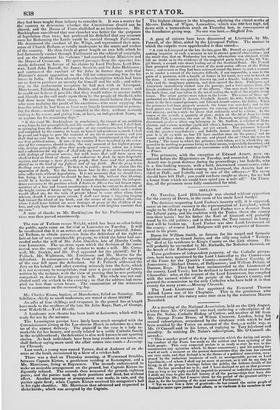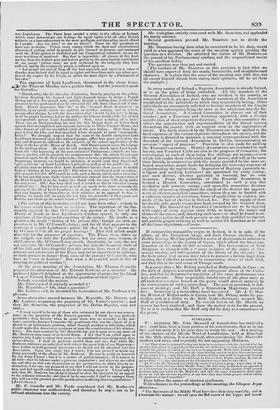At a meeting of the National Association, held on the
25th August, a letter from Mr. O'Connell was read, enclosing a subscription of 5/. from Dr. Nolan, Catholic Bishop of Carlow, and another of 10/. from Mr. George Evans Bruce, of Wilton Crescent, London being his second subscription, occasioned by the virulence with which he had been assailed by the Tories on account of the first,—a noble way, as Mr. O'Connell said in his letter, of replying to Tory falsehood and rascality. In noticing Dr. Nolan's subscription, Mr. O'Connell ob- served— This is another proof of the deep impression which the daring and insult- ing conduct of the Peers has made on the mildest and least agitating of the Irish people. This very respected prelate is as ready as ever he was to dis- countenance any agitation which he deems unnecessary ; and his coming for- ward at such a moment as the present demonstrates that the iron has entered our very souls, and that Ireland is in the throes of a political convulsion, occa• sinned by the audacious insolence of such an unrespectable person as Lord Lyndhus st,—of whom I shall say no more at present, as it will be my duty to bring, in all its proper bearings before the public, the hideous details of his life, lie has provoked me to it ; and I have declined to act on that provoca- tion as long as my reply could be imputed to personal or individual resentment. I abide my time to give the full history of all the partnerships that have dis- tinguished his life ; but I reserve them for the period of the greatest utility— that is, for the beginning of the next session of Parliament. " Yet we owe him a debt of gratitude—he has roused the entire people of Ireland to insist upon justice from others, or to vindicate it for ourselves in our own Legislature. The Peers have created a crisis in the affairs of Ireland, which must demonstrate our feelings for equal rights with all other British subjects, or a base submission to the most profligate and degrading insult offered to a people. Are we men? or are we slaves? These are the quettions we have now to decide. Unless every enetgy which the legal and constitutional channels of seeking relief do permit be put forward at present, and continued until the Tithe system is abolished and our Corporations reformed, we are the afloat worthiest of mankind. But that is impossible: all classes of the Irish nation, from the highest peer and holiest prelate to the most humble contributor of one penny ' justice rent,' are now awakened by the indignity they have suffered, and by the contumely which is inflicted upon us.
" Let us now one and all fling off the foul reproach, and insist in a voice of thunder that Ireland shall be equal in rights and franchises with any other por- tion of the empire by the Union, or attain the same object by a Parliament of her own."
The exposure of Lord Lyndhurst, threatened in the above letter, iCart the Times on Monday into a perfect fury. Let the jcurnalist speak for himself- " Daniel, who, like the chevalier d'industrie, lives by preying on the public, has been devoting his learned and light- fingered leisure to doing a Popish Bishop out of a five- pound note, which, though a trifling feat, is clearly the cleverest he has performed since be extracted the 501. from close-fisted Cleve- land. Daniel announces this do ' to the Gencial Grab Association ' in Dublin, in an epistle which we publish in another column, and in which, among other things, he tells the Association that ' it will be his duty to bring, in all its proper bearings, before the public, the hideous details of filo life of that unrespectable person Lord Lyndhurst.' Now' what a falling off is here! There was no blackguardism too foul for this blatant beast to bellow forth against that accomplished and eminent statesman at White Conduit House, and other houses of call for assembled rebels of his own kidney. How then hap- pens it that the false and foul-mouthed fellow descends to mere ' unrespecta- bility ?' We strongly suspect that the scars of the fearful castigation Lord Lyndhurst bestowed upon this national pauper, afflict him more even than the pain and disgrace he suffered on the occasion of the actual application of the whip at the bar of the House of Lords. Still Daniel cannot screw his courage to the sticking. place. He says he will postpone his attack upon Lord Lynd- hurst till the beginning of the next session of Parliament,'—which, we ven- ture to predict, will be precisely the postponement that the attack he last year promised upon Sir R. Peel underwent—that is to say, a postponements/lee die. Supposing, however, we should be mistaken, it would seem that Daniel will 'give a history ' of Lord Lyndhurst's pricute as well as of his public uk. Of all public men we believe that Lord Lyndhurst has the least reason to shrink front a history of his private life.' But what an unredeemed and anredeent- able scoundrel is this 0' Connell, to make such a threat, and at such a time too ! If he has not lied more foully than it could have entered into the imagination of the Devil himself to lie, he makes the threat with his own wife dying under his very eyes ! Oh! lion, long shall such a wretch as this be tolerated among civilized men ! But let him mark us well—as surely as he dares to invade the
privacy of the life of Lord Lyndhurst, or of any other man, woman, or child that may happen by themselves or their relatives, to be opposed to him in politics, so surety will we carry the w ir into his domiciles at Derrynane and Dublin, and show up the whole brood of O'Conuells, young and old."
[The writer of this bestiality could not have been sober : nobody in his senses would have been so reekless. The repetition of the tho- roughly-exposed lie that O'Connell was present at the bar of the House of Lords to hear Lyndhurst's Catiline speech is only one symptom of the disgraceful condition of the writer. He marks as a quotation the words " history of his private life," though no such ex- pressien is in Mr. O'Connell's letter ; and for all that , appears to the contrary, it is only Lyndhurst's public life that is to be " shown up" by O'Connell "iii all its proper bearings." That will afford ample naaterials for the purposes of exposure. The Times, then, takes up the cudgels not only for Lyndhurst, but for every man, woman, or child, whom Mr. O'Connell may attack, threatening to carry the war not only into Mr. O'Connell's privacy, but into the domestic circle of all his kith and kin—forgetful that the private lives even of the pro- prietors and conductors of the Times may not be impervious to criticism, or their persons to danger from some of' the yourger 0' Connells, who have no " vow in heaven." But what a disgraceful mode is this of carrying on political warfare !]
At the same meeting of the Association, Mr. Thomas Reynolds proposed the admission of Mr. Edward Ruthven, as a member. He professed himself delighted at the opportunity of proposing his friend " hen,.st Edward Ruthven, a faithful guardian of their rights." Nobody seemided the motion.
Mr. Porter asked if anybody seconded it? Mr. Ileynolds—" Oh, what a question ?" Mr. Lawless said, he seconded the nomination of Mr. Ruthven with pleasure.
Some altereatioa ensued between Mr. Reynolds, Mr. Barrett, and Mr- Lawless, respeetiug the propriety of Mr. Porter's questiol ; and then Mr. Staunton, the proprietor of the Dublin Register, ruse and said-
, " I avow myself to he one of those who intimated by our cheers our concur.
renee in the propriety of Mr. Porter's question. I think he WdS perfectly justifiable; first, because when he spoke there was no seconder to the mo- tion ; secondly, because I conceive the gentleman who was the object of it is placed in an unfortunate position, either through accident or otherwise, which should make this Association postpone at least the consideration of his admissi- bility. The tone assumed by Mr. Reynolds has put it upon us to say more of 311r. Ruthven than many of us would desire. I feel that I sin called upon to explain why I take a course that seems to be considered as something more than extraordinary. I shall be perfectly candid then, and say, that while Mr. Ruthven continues an individual with whom the great body of our Representa- tives dsclinc to hold personal intercourss, he should not be admitted into this Association. Upon this single ftet I stand ; I do not pretend to know any thing personally of the affairs of Mr. Ruthven. He may be guilty or innocent for any thing I know ; but it is a matter of perfect notoriety—it is known to all here—that he labours under a grievous imputation ; and when we are called on, and after an elaborate dissertation on his pretensions, to admit him by ac- clamation, I for one, am prepared to say that I will not assent to the proposi- tion, and feel myself called upon to divide the meeting upon it. I have only to add, that Mr. Ruthven has pledged himself to clear his character by an appeal to the ordinary tribunals; and that if he be successful I shall be amongst those who will have the greatest possible gratification in offering him congratulations." (Loud cheers.) Mr. P. Costello and Mr. Forde considered that Mr. Ruthven's public character was unblemished, and therefore he oug'it not to be refused admission into the society. Mr. Callaghan entirely concarred with Mr. Stau iton, and applauded his manly conduct. Several gentlemen pressed Mr. Staunton not to divide the meeting. Mr. Staunton having done what he conceived to be his duty, would yield to what appeared the sense of the meeting against pressing the question to a division. He admitted the claims of Mr. Ruthven on the ground of his Parliamentary conduct, and the unquestioned merits of his excellent father.
The question was then put and carried.
[The conduct of Mr. Staunton on this occasion is just what we should have expected from his manly, honourable, and straightforward character. It is plain that the sense of the meeting was with him, but all except himself shrunk from stating their opinions, till he set theca the example.]



























 Previous page
Previous page